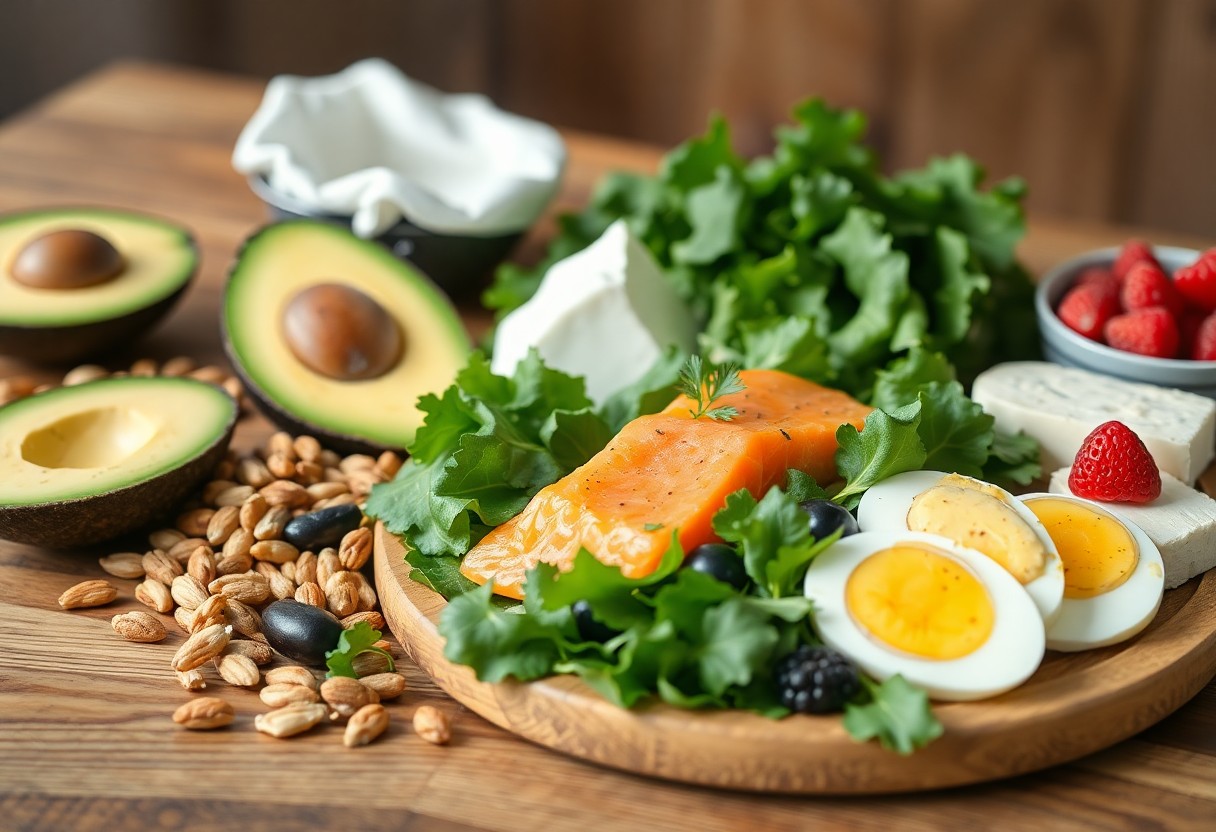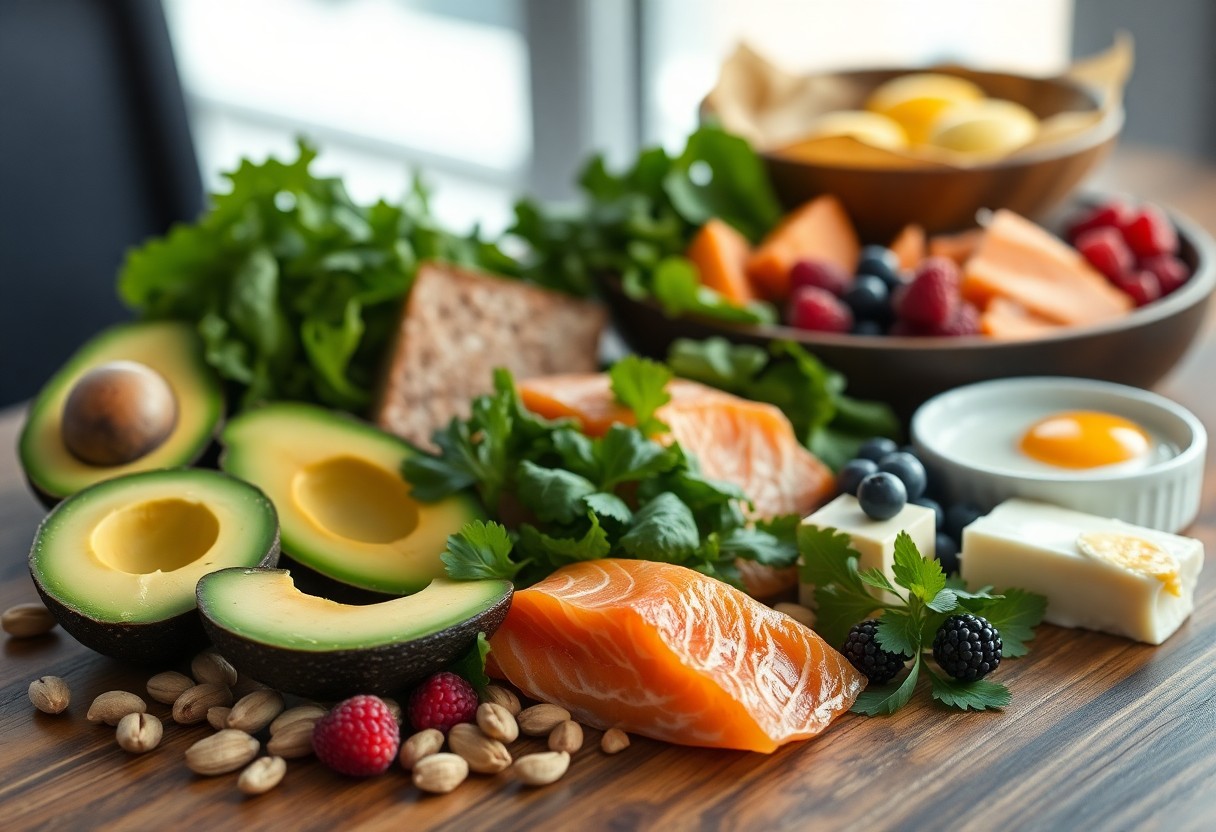Just plunging into the keto lifestyle can be both exciting and overwhelming. To help you navigate this low-carb journey, you need a clear understanding of the foods that will support your goals while satisfying your palate. This informative guide will walk you through an crucial list of keto-friendly foods that you can enjoy, allowing you to easily incorporate them into your daily meals. Get ready to transform your eating habits and embrace the tasty options that the keto diet has to offer!

Understanding the Keto Diet
The keto diet, short for ketogenic diet, is a high-fat, low-carbohydrate meal plan that shifts your body into a state of ketosis. In this metabolic state, your body becomes incredibly efficient at burning fat for energy instead of relying on carbohydrates. This shift can result in weight loss and improved energy levels, as your body adapts to burning stored fat. By significantly reducing your daily carbohydrate intake, you will increase your fat intake, making fats the primary energy source for your body.
What is the Keto Diet?
One of the main principles behind the keto diet involves drastically minimizing carbohydrate intake to stimulate ketosis, where your liver converts fat into ketones for energy. This means that traditional sources of energy, like sugars and grains, are replaced with healthy fats, lean proteins, and non-starchy vegetables. By following this diet, you will not only change the way your body processes energy but also gain more control over your hunger and cravings.
Benefits of a Keto Lifestyle
Understanding the benefits of a keto lifestyle can motivate you to stay committed. This diet is known for enhancing weight loss, improving mental clarity, and boosting energy levels by stabilizing blood sugar. With the reduction of carbs, many people experience reduced hunger pangs, making it easier to adhere to your dietary goals. Additionally, transitioning to a ketogenic lifestyle can lead to improvements in health markers such as cholesterol levels and insulin sensitivity.
Also, many keto adherents report more stable energy levels throughout the day, alongside increased focus and mental clarity. These benefits stem from the consistent energy provided by fat rather than the ups and downs caused by sugar. Additionally, the keto diet has shown promise in various health conditions, including managing type 2 diabetes and improving brain health. This combination of weight management and health improvements can be life-changing, helping you feel better both physically and mentally.
Essential Foods for a Keto Diet
Some key foods that you should enjoy while following a keto diet include avocados, eggs, meat, and dairy options like cheese and yogurt. These foods are low in carbs and high in healthy fats, helping you to maintain your energy levels while in ketosis. For a more comprehensive guide, consider checking out this 100+ Keto Foods List: A Comprehensive Guide to Eating ...
Healthy Fats
To succeed on a keto diet, you must incorporate healthy fats into your meals. Focus on sources like olive oil, coconut oil, nuts, and fatty fish. These fats not only satisfy your hunger but also provide crucial nutrients while keeping your carb intake low, which supports your journey towards ketosis.
Low-Carb Vegetables
One important category of foods to include in your keto diet is low-carb vegetables. These vegetables are packed with vitamins and minerals while being low in carbohydrates, making them an excellent choice to complement your meals. Think leafy greens like spinach and kale, or veggies such as zucchini and cauliflower.
Diet plays a significant role in your overall health and well-being. By incorporating low-carb vegetables into your meal plan, you enhance your nutrient intake without the excess carbs that can disrupt ketosis. Opt for a colorful variety to ensure you're getting a wide range of vitamins, minerals, and antioxidants crucial for your body's functions.
Protein Sources to Include
Not all protein sources are created equal on the keto diet. For optimal results, focus on high-quality meats and seafood to ensure you're getting the important nutrients while maintaining low carb intake. Embrace variety in your protein choices, as this will help you stay satisfied and energized throughout your keto journey.
Meat and Poultry
At the core of the keto diet lies a rich selection of meat and poultry options. You can enjoy fatty cuts of beef, pork, and chicken, as they provide ample protein and are packed with healthy fats. Opt for grass-fed and pasture-raised varieties whenever possible to maximize nutritional benefits.
Fish and Seafood
Below you'll find an abundance of fish and seafood choices that perfectly align with your keto lifestyle. Fatty fish like salmon, mackerel, and sardines not only deliver high levels of omega-3 fatty acids but also provide protein without unwanted carbs. Shellfish such as shrimp and scallops offer additional variety while keeping your meals exciting and flavorful.
Sources of fish and seafood can significantly enhance your ketogenic diet. They are generally low in carbohydrates and rich in protein, making them ideal for keeping your macros in check. Incorporating a diverse range of options helps you enjoy your meals while reaping the health benefits associated with omega-3s and other important nutrients found in these delicious protein choices.

Dairy and Alternatives
Now, incorporating dairy and its alternatives into your keto lifestyle can enhance your meals without compromising your low-carb goals. Full-fat options are packed with flavor and nutrients, making them a perfect addition to your diet. Whether you prefer cheese, yogurt, or plant-based alternatives, knowing what fits into the keto framework allows you to enjoy diverse flavors while staying in ketosis.
Full-Fat Dairy Products
At the heart of a ketogenic diet are full-fat dairy products, which are low in carbs and high in healthy fats. Options like heavy cream, cream cheese, and full-fat cheese not only add richness to your dishes but also offer important nutrients. These options can contribute significantly to maintaining your energy levels and overall satisfaction on your keto journey.
Plant-Based Alternatives
Dairy alternatives are a fantastic option if you're looking to avoid animal products while sticking to your keto lifestyle. Plant-based alternatives such as almond milk, coconut yogurt, and cashew cheese can provide flavor and creaminess to your meals. Be sure to select unsweetened versions to keep your carb intake in check.
Hence, exploring various nut and seed-based milks can deliver diverse tastes and textures to your diet. Look for low-carb options like unsweetened coconut milk or almond milk, which can serve as great bases for smoothies or coffee. Additionally, plant-based yogurt can be an excellent source of probiotics while keeping your carb count low. With a little creativity, you can create delicious meals that satisfy your cravings and align with your keto goals.
Snacks and Treats
Unlike typical diets, the keto lifestyle allows you to indulge in delicious snacks and treats while keeping your carb count low. From cheese crisps to nut butter, you can satisfy your cravings without derailing your progress. To explore options that align with your keto journey, check out this 11 Foods You Can Eat on the Keto Diet. Enjoying tasty snacks helps you stay on track and makes your journey enjoyable.
Keto-Friendly Snacks
The right keto-friendly snacks can bolster your energy levels and curb hunger between meals. Focus on options like olives, pork rinds, or vegetables dipped in guacamole. These snacks are not only low in carbs but packed with healthy fats that support your keto goals.
Satisfying Desserts
Satisfying your sweet tooth on a keto diet is easier than you might think. With the right ingredients, you can create desserts that are low in carbs yet full of flavor. Think along the lines of rich chocolate mousse or creamy cheesecake made with almond flour crust.
Plus, you can sweeten your treats with keto-friendly alternatives like erythritol or stevia, ensuring you enjoy every bite without guilt. These desserts can become a favored part of your keto lifestyle, allowing you to indulge while staying committed to your health goals.
Foods to Avoid on Keto
Many foods can quickly derail your ketogenic journey if you’re not mindful of what you consume. Staying on track means steering clear of items that can spike your carb intake, pushing your body out of ketosis. By avoiding certain categories of food, you can effectively maintain your state of ketosis and enjoy the benefits of the keto lifestyle.
High-Carb Foods
Any food rich in carbohydrates can hinder your progress on a keto diet. Foods such as bread, pasta, rice, and most fruits can significantly increase your daily carb count. Instead, focus on low-carb alternatives to help you remain in ketosis while still enjoying delicious meals.
Processed Items
Below the radar, many processed items contain hidden sugars and starches that can disrupt your keto diet. By steering clear of these products, you're less likely to consume unnecessary carbs that can impact your health goals.
Also, it's imperative to scrutinize the ingredient lists on packaged foods, as many contain added sugars and unhealthy fats, often disguised under various names. Avoid sugary snacks, sweetened beverages, and pre-packaged meals that claim to be healthy but may contain more carbs than you realize. Opt for whole, unprocessed foods whenever possible to stay aligned with your keto lifestyle.
Summing up
Presently, mastering the keto lifestyle is necessary for your health and wellness journey. By incorporating the right foods into your diet, you can enjoy a range of delicious options that align with your goals. Your commitment to understanding what you can eat is key to your success. For a comprehensive overview, check out The Complete Keto Grocery List (With Free PDF) to simplify your shopping and meal planning process.
FAQ
Q: What are some of the best fats to include in a keto diet?
A: When mastering the keto lifestyle, incorporating healthy fats is vital. Some of the best options include avocados, olive oil, coconut oil, and grass-fed butter. These fats not only provide energy but also are rich in nutrients that support overall health. Additionally, nuts and seeds, such as almonds and chia seeds, can be excellent sources of healthy fats.
Q: Can I eat dairy on a keto diet?
A: Yes, dairy can be a part of the keto lifestyle! Full-fat dairy products like cheese, heavy cream, and unsweetened yogurt can be enjoyed in moderation. However, it’s important to be mindful of lactose content if you are sensitive to it, and always choose high-quality, low-carb options to stay within your daily carb limits.
Q: Are there any vegetables I should avoid while on a keto diet?
A: While many vegetables are keto-friendly, it's best to avoid starchy ones such as potatoes, corn, and peas, as they contain higher levels of carbohydrates. Instead, focus on leafy greens like spinach and kale, cruciferous vegetables like broccoli and cauliflower, and other low-carb options such as zucchini and bell peppers. These choices provide vital nutrients while keeping your carb intake low.
Q: Is it possible to find snacks that align with a keto lifestyle?
A: Absolutely! There are numerous keto-friendly snacks available. Some great options include nuts, seeds, cheese slices, beef jerky, and hard-boiled eggs. You can also prepare snacks like guacamole with veggie sticks or fat bomb treats made from coconut oil and nut butter. These snacks help to keep your energy levels up while adhering to your dietary goals.
Q: How can I ensure I'm getting enough electrolytes on a keto diet?
A: Transitioning to a keto lifestyle can lead to a temporary decrease in electrolyte levels, so it’s important to replenish them. Focus on consuming foods rich in potassium, magnesium, and sodium. Good sources include leafy greens, nuts, seeds, and avocados. Additionally, consider drinking bone broth or electrolyte supplements, and stay hydrated to maintain overall balance during your keto journey.

0 Comments